"The history of all hitherto existing society is the history of class struggles."
This is one of the most famous and oft-quoted statements in the history of political literature. The footnote reminds us that it is written history that we are talking about, i.e. since the "dawn of civilization". After the statement, Marx, lest we take his opening statement as rhetorical flourish or figure of speech, lays out the division of classes in previous epochs, as we know them, and will briefly explains where our current classes come from. These are no passing remarks. Marx does not say that class struggle is as old as the beginning of human civilization, nor does he say that it is one of several factors that influence history. He says that the whole of written history IS the history of class struggle... that everything else that we know derives from this. Marx doesn't exactly leave a lot of room for what passes as the "modern", complex perspective on social evolution. But... several questions arise:
What does this mean?
Is it true?
What is the basis of these social "classes" and how do they stand in relation to each other?
How are one set of class relations superceded by another?
How can something so basic, if true, not be indisputably obvious?
What does this mean?
Fear strikes me here, the fear of seeming dopey, and perhaps I'm still wearing the blinders given to me at birth, but ...
I took the statement to mean that, history is simply defined as worker against boss.
Is it true?
Provided my simplistic answer above is correct, the answer is yes. Actually, even without my answer above being correct, I'd say yes.
What is the basis of these social "classes" and how do they stand in relation to each other?
I suppose the basis is: who maintains dominion over the essential (and non-essential, yet desired) elements for living.
Relation: adversaries
How are one set of class relations superceded by another?
When the boss becomes the worker of a different boss.
How can something so basic, if true, not be indisputably obvious?
The boss provides to the worker a set of beliefs.
- Anaxarchos
"The history of all hitherto existing society is the history of class struggles."
Re: "The history of all hitherto existing society is the history of class struggles."

Relevance of the Manifesto of the Communist Party in the 21st Century.
Originally published: Midwestern Marx by Carlos Alarcón Aliaga - Instituto Marx Engel (January 3, 2022 ) | - Posted Jan 11, 2022
The death of communism has been pronounced time and time again, but every day it is still fought against without respite or pity. There is no popular act or uprising which the bourgeoise does not see as a sign of communism, no nationalist or progressive opinion which is not branded as communist.
There is no doubt that since the publication of the Manifesto of the Communist Party in February of 1848 the bourgeoisie can no longer rest easy. The world has changed much since then, many references made that are since outdated, but its “general principles” remain valid, having been verified scientifically and confirmed by historical events.
The Communist Manifesto highlights the historical role of capitalism and how it has replaced relations based on patriarchy, the family, religion etc. with cold monetary interest, with “the icy water of egotistical calculation”. For the first time the trends of capitalism are laid out, from its birth in the European feudal system and its expansion all over the world, creating the global marketplace that we today call “globalisation”.
Marx and Engels foretold such a situation by stating, “The bourgeoisie has through its exploitation of the world-market given a cosmopolitan character to production and consumption in every country” (The Communist Manifesto, p.25). In the same way, they recognised that capitalism, “has made the country dependent on the towns…barbarian and semi-barbarian countries dependent on the civilised ones, nations of peasants on nations of bourgeois, the East on the West” (p.26), forming its imperialist stage. What’s more, they correctly pointed out that, “The bourgeoisie cannot exist without constantly revolutionising the instruments of production” insofar as they aid the creation of profits (p.24).
But the Communist Manifesto has highlighted not only economic trends, but also political, by pointing out that, “The executive of the modern State is but a committee for managing the common affairs of the whole bourgeoisie.” (p.23).
Without a doubt, there are many more contributions from the Communist Manifesto that we cannot stop to go over in this brief article, and so we will only touch on those that have been most attacked with the aim of removing its revolutionary edge.
The history of all hitherto existing history is the history of class struggles
Out of all the various social relations, relations of production are the main ones. Since the appearance of the social division of labour between manual and intellectual and the ownership of the social means of production, the division of men and women into two fundamental classes has emerged: the possessors of the means of production and the dispossessed. The group of people who took over the means of production dominate the dispossessed, making them work for their own enrichment.
For this reason, the Manifesto starts by saying that history “is the history of class struggles”. Masters and slaves, patricians and plebeians, lords and serfs, masters and tradesmen, that is to say exploiters and exploited, oppressors and oppressed have always clashed, sometimes subtly and other times frankly and openly.
Capitalism has not eliminated class contradictions; it has substituted the old classes for new ones; now everything revolves around the contradiction between capitalists and workers. Thousands of times it has been denied, and thousands of times it has been confirmed by reality. The bourgeoisie, unable to hide these contradictions, accepts them, but denies their origins as being in the possession or dispossession of the means of production, or in the position of people within the social relations of production.
For the capitalists, social classes are defined by their capacity for consumption, and these are the classes A, B, C, D and even E, within which class interests dissipate. This same criterion serves to sort the classes into upper, middle and lower, and since no one wants to damage their social prestige, a large number of proletarians feel flattered when they are placed in the middle class.
However, what the bourgeoisie cannot accept in any form, is the existence of class struggle. To accept it would be to recognise that in all aspects of society the interests of the class of big national and international capital take precedence, imposing themselves despotically on the relationships between capital and labour, on the free market that serves only to make a profit from the needs and lives of the people, on the State to guarantee their interests and impede the rights and demands of the exploited and oppressed.

This situation of domination compels the exploited and oppressed classes to defend their rights, organising, mobilising, taking part in strikes etc. It cost the workers and the people of the 19th and 20th centuries great days of struggle for the legal recognition of their rights. For this reason, imperialist capital has counterattacked to shatter the workers’ organisations and defeat the Soviet Union and, having done this, has rolled out neoliberalism to take away democratic and workplace rights, neutralise the trade unions and the right to strike under the threat of being fired, etc. Thus, class struggle is exactly this bourgeois domination, and it exists even if the oppressed classes do not have the capacity to defend themselves and are not mobilising or going on strike.
Class struggle is not a style nor a method of doing politics, as the Ecuadorian ex-president Rafael Correa so candidly declared in his time. Class struggle exists in social reality and is a consequence of the division of society into owners and non-owners of the means of production.
Capitalism has simplified class contradictions: bourgeoisie and proletarians
In the Communist Manifesto we read,
Our epoch, the epoch of the bourgeoisie, possesses, however, this distinctive feature: it has simplified the class antagonisms. Society as a whole is more and more splitting up into two great hostile camps, into two great classes directly facing each other: Bourgeoisie and Proletariat. (The Communist Manifesto, pp.21-22)

We arrive, therefore, at the most heavily criticised element of the Communist Manifesto and of the economic and social theory of Marxism. The working class, we are told, grows ever smaller.
It results that the bourgeoisie, in order to judge the Communist Manifesto, use the categories of bourgeois “science”, which is why they speak a different language to that of Marx. In ‘Capital’, wage-earning workers are always the working class, because within capitalism the principal relationship of production is between capital and waged work, and never the relationship between capital and worker, or between capital and employee. For this reason, the working class encompasses all employees and not the simplistic workplace category that the bourgeoisie use in their factories.
Furthermore, Marx uses the word ‘worker’ in its full meaning, the worker is the person who has worked and produced ever since they appeared on the face of the earth. In this way, showing that human work is superior to that of animals, such as the spider or the bee, because before carrying out the work the worker first maps it out in his mind. Marx says:
At the end of every labour-process, we get a result that already existed in the imagination of the labourer at its commencement. He not only effects a change of form in the material on which he works, but he also realises a purpose of his own… (Capital Volume I, p.127)
To be a worker is to be a producer; it is innate in human beings and present throughout history. With a society divided into social classes, the workers are the ones who commit themselves to working so that others; the owners of the social means of production; may live and grow rich off their labour. Under capitalism, workers are proletarians as defined by Friedrich Engels:
By proletariat [is meant] the class of modern wage-labourers who, having no means of production of their own, are reduced to selling their labour-power in order to live. (The Communist Manifesto, p.21)
However, labour-power has been understood as if one were only speaking of physical force, ignoring the display of knowledge, experience, and intelligence on the part of the worker. Marx defines it with some clarity,
By labour-power or capacity for labour is to be understood the aggregate of those mental and physical capabilities existing in a human being, which he exercises whenever he produces a use-value of any description. (Capital Volume I, p.119).
We see, then, that labour-power and capacity for labour mean the same thing and include all the spiritual faculties present in the personality of the worker, such as free will, love or hate of work, emotions of anger and anguish, concentration, knowledge, intelligence, abilities, etc.
The capitalist buys these capacities for labour for them to carry out a collective work and produce the goods that he must sell on the market. This social work is a process in which different people, with different qualifications and skills, intervene.
In this regard, Marx tells us,
In a factory, the labourers do not directly take part in the processing of raw materials. The workers tasked with watching over those who work on these processing tasks are of a slightly higher category; engineers who work principally with their heads. Yet the result is the production of this ensemble of workers, who possess a labour power of distinct value […]. The type of capitalist production is characterised, in effect, by the act of separating and entrusting different people with various jobs, both intellectual and manual. This doesn’t prevent the product material from being the common product of all these people, nor that this common product is translated into material wealth, nor that each one of these people is, with respect to capital, a salaried worker, a productive worker in the highest sense of the word. All of these people, in addition to working directly in the production of material wealth, directly exchange their work for money considered as capital and therefore, in addition to their salary, directly reproduce a surplus value for the capitalist. (Teorías 1, p.224 translator’s version)

All the capacities of the workers merge in this collective labour, capacities which are sold in exchange for a salary, and which provide a surplus value for the capitalist. The proletarian class is not just those who directly manufacture a product, but rather all those workers who take part in its production. The capitalists cannot do away with the working class, and so their foremost resolution is to divide it and with this same objective carry out labour outsourcing, through which workers who are indispensable to the production process are recategorized as tertiary and without any labour rights. (“El Capital” hoy, Chapter II)
This throws the bourgeois categorisation into disarray and shows that the working class maintains its power and its role within the capitalist system. However, there is still more to discuss: we have only spoken of the proletariat that has succeeded in selling its capacity for work, let us now see what happens to those who do not have such luck.
The tendency towards the proletarianization of capitalist society is unstoppable
In its advance over the world capitalism continually disintegrates or subordinates the past modes of production, uproots thousands upon thousands of peasants and artisans from their land and their means of production, creating a new social class: the proletariat. The proletarianization of the population of the population has always been greater than the capacity for employment of capital, generating a relative overpopulation which Marx called a “reserve army of labour” because it constituted a source of labour for the necessities of the expansion of capital and for maintaining low wages. Marx and Engels used the categories of working class and proletarian class interchangeably, because although a reserve army of labour was created, for proletarians who did not manage to sell their labour power, sooner or later they would do so, according to the empirical observations and the limits of the statistics from the time in which they lived.
In the 19th century and well into the 20th century this reserve army of labour became more stable in the developed capitalist countries of Europe, which one can attribute to a phenomenon exclusive to underdeveloped countries. This tendency towards the overgrowth of the reserve army of labour was undetectable in those times because there was a release valve of excess European proletarians as they emigrated to Australia and the New World, where they found better sources of work and better opportunities in land, displacing the indigenous populations, often through blood and fire, which was known as the North American “conquest of the west”. What’s more, the first and second world wars, aside from dividing up the world, also served capitalism by destroying part of the excess workforce.
Today, in the 21st century, the tendency towards the growth of proletarianization and the incapability of capitalism to provide employment has increased on the one hand and, on the other hand, there are no more indigenous populations with appealing lands to be displaced, or another world war to relieve the excess of the proletarian population. Under these circumstances we have millions of proletarianized people who cannot find a capitalist to whom they can sell their capacity for work, and this has produced a growth in freelance or gig workers and, to a lesser extent, in micro businesses, which represent some 93% of economic activities within the European Union (Círculo de Empresarios, p.81), mirroring underdeveloped countries.

These proletarians, when they are unable to find work, find themselves forced to take refuge in a business of subsistence, because under capitalism everything is bought and sold, and no one can live without an income. They find themselves forced, through various means, to make some small amount of capital for themselves and start a business that is the easiest and most accessible to their poverty, especially petty commerce and services.
This situation is taken by the epigones of capital to organise their statistics and argue for the reduction of the proletariat because a large portion of the economically active population are dedicated to tertiary jobs. They deliberately hide that nearly the entirety of this sector are independent contractors who have no capacity for contracting labourers, are fundamentally self-employed, and their economy is a subsistence one with no capacity for accumulating capital. This reality makes them semi-proletarians, and all the political aid programmes do nothing for them because these are for the petty bourgeoisie; they don’t realise that they have their own interests which are very different from any other bourgeois splinter. (“El Capital” hoy, chapter 9)
Salaried workers and the semi-proletariat make up more than 80% of the economically active population in capitalist countries, which confirms the tendency highlighted in the Communist Manifesto that. “Society as a whole is more and more splitting up into two great hostile camps, into two great classes directly facing each other: Bourgeoisie and Proletariat.” (p.22)
Capitalism can no longer control the powers of the nether world that it has created
Capitalism, seeking the greatest profits, has taken over the world and developed never before seen technological powers, with a sufficient productive capacity to solve world hunger. However, it does not do this because it is not prepared to give up the products it has available if it is not paid the price it demands.
Its eagerness for profit leads it to produce to earn more and more, in a race of producing capital for the sake of producing, until there is an excess of goods in relation to the buying capacity of the population. In this bottleneck financial capital gives out quick and easy loans, not just for production, but also for consumption, creating a fictitious demand and postponing crises.

In this race economic bubbles grow until they pop, such as in the 2007-2008 crisis, from which capitalism has never recovered; a great relapse was announced in 2020 when the pandemic arrived. The only thing that COVID-19 has done is deepen the crisis to unforeseen levels.
There is a great certainty when the Communist Manifesto says, “Modern bourgeois society with its relations of production, of exchange and of property, a society that has conjured up such gigantic means of production and of exchange, is like the sorcerer, who is no longer able to control the powers of the nether world whom he has called up by his spells.” (p.28)
The crisis that the world is living through has completely unmasked capitalism. By prioritising businesses and capitalist speculation not one developed capitalist country has been able to tackle the health crisis; compared to China, Cuba, Vietnam, even Venezuela, they are an absolute embarrassment.
Knowing their sanitary shortcomings for handing over health to the voracity of private profit, capitalist countries have had the necessary resources to counteract the epidemic, which has resulted in 2.5 million deaths from COVID-19 in just one year (Google news), which must be doubled if one considers all the deaths due to distraction from other illnesses.1
It would seem that the bourgeoisie is taking advantage of the situation to do away with the excess of proletarians to whom it could never give employment; it is horrifying to learn that in Madrid and New York they have intentionally stopped checking in on retirement homes.
What has happened to the gravediggers of capitalism?
The economic and political situation of the world today seems to clash with what Marx and Engels said of the proletariat in 1847, “But not only has the bourgeoisie forged the weapons that bring death to itself; it has also called into existence the men who are to wield those weapons–the modern working class–the proletarians.” (Communist Manifesto, p.29)
The suffering of the proletariat from the 2008 crisis and the global crisis that we are currently living through is tremendous. Even before the pandemic, the cutback and annulling of labour rights were unstoppable; millions of workers lost their jobs, their savings, and their houses in developed countries.
Such was the suffering that between 2007 and 2017 in Spain some 17,000 people took their own lives for economic reasons (HISPANTV). Add onto that the millions of deaths due to COVID-19 in the last year, the millions of workers who have lost their jobs and salaries, the millions of independent contractors who have lost their precarious businesses etc.
The responses of the workers are lacking in focus. Some have had global impact, such as the mobilisations in the United States, France, India, Belgium, and Spain among the more well known. Only the mobilisations of the Chilean people have had a political focus against neoliberalism. But not one of these examples questions the capitalist system.
This situation of the global proletariat is not down to the Communist Manifesto being wrong. After its publication the global proletariat carried out historic struggles which have changed the course of history in previous centuries.
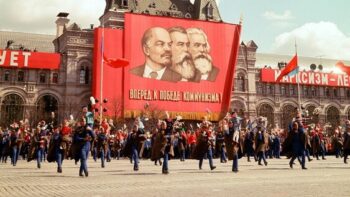
The 1872 Paris Commune was followed by the great 1917 proletarian revolution in Russia, which started the first attempt to build an alternative society to capitalism in the world, taking this immense country from underdevelopment to becoming the second greatest world power, capable of defeating Hitler’s powerful Nazi army. From then would come the revolutions in China, Korea, Cuba, Vietnam etc and an ample national liberation movement in Africa, Asia, and the Middle East.
It would come to pass that the imperialist bourgeoisie also learned and carried out a counterattack on various fronts:
*Overthrow the Soviet Union by hounding it with the “Cold War” and a global ideological smear campaign as an alternative to capitalism.
*Domesticate the heads of union organisations, integrating them into the bourgeois system.
*Assimilate the workers’ parties so that they take on political positions to integrate into the system and renounce revolutionary Marxism and
*An ideological campaign, never seen in history, using all the means of communication, television, radio, cinema, schools, universities, churches, etc. to convince everyone that there exists only one social alternative: capitalism.
With the union and political organisations domesticated and the Soviet Union overthrown, all the banners of neoliberalism were unfurled, coming to cut yet more labour and union rights, but above all to impose work flexibility, giving legal capacities to the bourgeoisie to fire any who tried to organise unions. For these reasons, for example, in Peru only 5% of workers are in a union.
This situation explains why the proletariat cannot organise a meaningful response to the aggressions they receive from the bourgeoisie and why, lacking an ideology and revolutionary parties, they do not carry out their struggles to end this economic, social, and political system which threatens not just workers, but all of human civilisation.
It is time then to learn the lessons of history, overcome this disorganisation, end the relaxation of work laws, etc. Above all, to organise ourselves into a revolutionary party as the Communist Manifesto demands and carry out a wide-ranging political and ideological struggle for the historical interests of the proletariat of Peru and the world, in an independent manner, banishing the copycat attitudes of bourgeois governments and politicians.
Notes:
↩ At the time of translation (December 2021) this figure has increased to 5.3 million deaths
Bibliography
*Alarcón, C. “El Capital” hoy: Capitalismo y crisis en el S. XXI
Círculo de Empresarios (2018). ‘La empresa mediana española’. Available at: circulodeempresarios.org (Accessed: 22/12/2021).
*Google News. ‘Coronavirus (COVID-19)’. Available at: news.google.com/covid19/map?hl=es-419&gl=PE&ceid=PE%3Aes-419
*HISPANTV (2018). ’17 mil españoles se suicidan desde 2007 por causas económicas’. Available at: www.hispantv.com (Accessed: 22/12/2021).
*Marx, K. and Engels, F. (2015). Capital: A Critique of Political Economy: Volume I. Available at: www.marxists.org (Accessed: 08/12/2021). (First published in 1867).
*Marx, K. and Engels, F. (2004). The Communist Manifesto in The Communist Manifesto & Selected Writings. Pan Macmillan: London. (First published in 1848).
https://mronline.org/2022/01/11/relevan ... t-century/#
"There is great chaos under heaven; the situation is excellent."
Re: "The history of all hitherto existing society is the history of class struggles."

Peter Thiel Reveals How Scared Oligarchs Are Of The People
Plutocrats like Thiel are constantly thinking about the fact that ordinary people vastly outnumber them and can kill them at any time. They think about it way more often than ordinary people do.
Caitlin Johnstone
December 17, 2024
Billionaire Peter Thiel had a fascinating televised moment the other day when asked by Piers Morgan what he thought about the public making a hero of the man suspected of murdering health insurance CEO Brian Thompson. The way he stumbled and stuttered when trying to answer the question gives a lot of insight into how terrified such people are of the public turning against them one day.
“And to those who think this shooter is a hero, because he did it because he said this healthcare executive is presiding over a healthcare system which kills thousands of Americans by denying them cover, what would you say to them?” Morgan asked.
Thiel paused for a long time, and then stuttered for a long time, and then eventually got out the words, “It’s, I don’t know what, what to say? I, I think I still think you have, you should try to make an argument. And I, I think this is, this is you should, you know, there may be things wrong with our health care system, but you have, you have to make an argument, and you have to try to find a way to convince people and and change, change it by by that, and this is, you know, this is not going to work.”
For those who don’t know, Thiel is a proper deep state oligarch who owes his vast fortune to his enmeshment within the US military-intelligence machine. His company Palantir is a CIA-backed surveillance and data mining tech company with intimate ties to both the US intelligence cartel and to Israel, playing a crucial role in both the US empire’s sprawling surveillance network and Israeli atrocities against Palestinians. He backed Trump in 2016, and Vice President-Elect JD Vance was a protégé of his, so this man is thoroughly entrenched in the halls of power.
Thiel’s blustering response when asked what he thought about the public support we are seeing for the practice of assassinating health insurance CEOs reveals a lot about the kinds of things that keep men like Peter Thiel up at night.
Plutocrats like Thiel are constantly thinking about the fact that ordinary people vastly outnumber them and can kill them at any time. They think about it way more often than ordinary people do. It’s a point that they are acutely aware of at all times. It consumes their attention. They are always working on manipulating public consciousness to ensure that we don’t think as much as they do about how many more of us there are of them, and how we don’t have to put up with their domination of our society if we don’t want to.
As Michael Parenti once put it:
“I tell students when they say, ‘Oh they don’t care what we think. They ignore us’, and all that, and I say, ‘Oh no, no. That’s the only thing they care about you. The only thing they care about you is what you’re thinking. They don’t care if you eat correctly, they don’t care how your living conditions are, they don’t care that they’ve built up an inhuman and irrational traffic system that’s strangulating us and polluting our air, they don’t care about anything. The only thing about you they care about is what you’re thinking. In the morning, they start, ‘What’s going to be the story today? How do we manipulate, how do we control, how do we contain, how do we influence, how do we act upon what it is that they have in their minds?’”
Manipulating public consciousness is of existential importance to the ruling class, because no matter how many billions of dollars you amass, at the end of the day you’re still a soft skin sack of blood and bones like anybody else, and you share a society with huge numbers of people who can very easily hurt you if they want to. That’s why our minds are constantly being hammered with propaganda into accepting the status quo politics upon which our rulers have built their kingdoms.
But we’re seeing the propaganda losing its grip on our minds. Hollywood tried to train people to believe heroes look like soldiers and cops, or billionaires using their wealth to become Iron Man and Batman, and then the people chose as their hero a guy who was arrested for shooting a health insurance CEO. The other day a DJ threw up pictures of the suspected shooter Luigi Mangione during his concert and drew cheers from the crowd — and this was at a Disney-themed show.
So that’s why the empire managers are pushing to get their killer robots up and running as quickly as possible.
https://twitter.com/Antiwarcom/status/1 ... 8490196220
Israel is reportedly preparing to deploy dozens of weapons systems in the West Bank which are capable of firing deadly rounds without human intervention, meaning fully autonomous killing machines as opposed to remote-controlled. These killer robots have already been in use on Israel’s border with Gaza.
Various military robots have been tested in Gaza since Israel’s onslaught on the enclave began last year, and now they’re expanding the field testing of their murderbots to the West Bank as well. Of all the horrible things Israel and its western backers do to the Palestinians, among the most evil is the way they use them as lab rats to field test new weapons systems so the rest of the empire can learn how effective those systems are.
You may be sure that empire managers like Peter Thiel are watching these developments with keen interest. Militarized robots are the anti-guillotine. They’re the final solution to the ancient “there are a lot more of us than there are of our rulers” problem. Everyone with wealth and power has been eyeing their incremental rollout with intense interest while trying to play it cool.
So at this point we’re essentially looking at a race to see if the oligarchic empire can manufacture the necessary environment to allow the use of robotic security forces to lock their power in place forever before the masses get fed up with the increasing inequalities and abuses of the status quo and decide to force a better system into existence.
It will be interesting to see how this plays out.
https://caitlinjohnstone.com.au/2024/12 ... he-people/
******
UnitedHealthcare & Corporate Rule
December 16, 2024
Derek Seidman says the violence of for-profit health care’s megastructure can only be overcome through collective resistance campaigns.

Police outside the corporate headquarters of UnitedHealthcare in Minnetonka, Minnesota, on Dec. 8, days after the company’s CEO Brian Thompson was killed in New York City. (Chad Davis,Wikimedia Commons, CC BY 2.0)
By Derek Seidman
Truthout
The killing of UnitedHealthcare’s Brian Thompson — a brazen assassination of a wealthy CEO in the streets of midtown Manhattan — shocked the United States.
But the tsunami of mass anger unleashed against a hated for-profit health care system has so far defined the story in the news.
The killing sparked a deluge of personal testimonies of horrifying experiences with health insurance corporations. Dark humor around the shooting continues to flood social media.
Millions of people in the U.S. viscerally hate health insurance corporations, and see these companies and their CEOs as symbols of the worst kind of corporate greed. They enrich themselves by charging huge deductibles and then still denying claims for health care coverage that people desperately need.
These corporations hold the power to ruin lives. It seems as if almost everyone in the U.S. has had a horrible experience with a health insurance corporation.
UnitedHealth Group — the parent company of UnitedHealthcare — is a poster child for this system. It is the biggest health insurance corporation in the U.S. Its top executives rake in tens of millions of dollars.
UnitedHealth Group has faced scrutiny for a range of alleged abuses, such as overcharging on Medicare bills and using AI to reject medically necessary coverage. It’s a leader in an industry that moves to crush any talk of a single-payer health care system.
It’s critical to understand the practices of UnitedHealth and the wider health insurance industry as systemic and bound up with the larger ensemble of corporate rule.
The problem isn’t just that health insurance CEOs callously deny coverage to patients to extract massive profits — it’s that if those CEOs didn’t do this, their boards of directors and shareholders would demand their replacement.
UnitedHealthcare CEO Brian Thompson was just one cog within a larger structure of company executives, corporate board directors, big investors, and an army of lobbyists and industry groups — all bent on preserving the system of private, for-profit U.S. health care that is nearly universally detested and requires collective organizing action to be dismantled.
Massive Profits & CEO Pay

Andrew Witty, CEO of UnitedHealth Group in December. (UnitedHealth Group, Wikimedia Commons, CC BY 4.0)
UnitedHealth Group is a massively profitable corporation. From 2021 to 2023 it took in nearly $1 trillion in revenue and nearly $60 billion in profits.
Last quarter it generated over $100 billion in revenue and $6 billion in profits. It ranks fourth on the Fortune 500 list of top U.S. companies.
The CEO of UnitedHealth — and, as head of UnitedHealthcare’s parent company, Thompson’s boss — is Andrew Witty, who was awarded a knighthood in 2012 by the British royal family and who hobnobs with Bill Gates and advises his foundation.
From 2021 to 2023, Witty raked in nearly $63 million as UnitedHealth’s CEO. Witty’s 2023 compensation of $23,534,936 was 352 times the median employee pay at UnitedHealth. By comparison, Thompson took in just under $30 million from 2021 to 2023.
Witty owns 97,172 shares of UnitedHealth stock, currently worth around $54 million, even as the company’s share value took a hit after Thompson’s killing. (It had reached an all-time high just weeks before.)
UnitedHealth CEOs have a history of receiving astronomical levels of compensation. Stephen J. Hemsley served as UnitedHealth CEO from 2006 through 2017, during which he came under scrutiny for taking home $102 million in 2009 after exercising stock options.
“If CEOs didn’t callously deny coverage to patients to extract massive profits, boards of directors and shareholders would demand their replacement.”
Today, Hemsley remains a powerful figure at UnitedHealth, serving as chair of its board of directors. In 2023, he raked in a whopping $113 million after selling off more of his UnitedHealth stock.
While UnitedHealth’s executives receive huge compensation, they’re not unique within the sector. For example, from 2021 to 2023, the CEOs of the next three largest U.S. health insurers were similarly compensated: Elevance Health’s CEO received over $61 million, CVS Health’s CEO received over $63 million and Cigna’s CEO received over $61 million.
Boards of Directors
Witty and other top UnitedHealth executives, in turn, answer to an even higher authority: UnitedHealth’s board of directors.
Corporate boards are companies’ highest governing bodies. They hire and review top executives and set their compensation. They are tasked with oversight of overall business and strategic risks. Board members annually receive hundreds of thousands of dollars for their board service.
Company boards are interlocked with larger structures of corporate rule. While UnitedHealth is a discrete entity, it’s also a node in a wider web of corporate power — a fact illustrated in the composition of its 10-member board of directors.
For example, one UnitedHealth director, Timothy Flynn, is the retired CEO of KPMG International, one of the “Big 4” global accounting firms. He was a board director of JPMorgan Chase, the world’s top bank, from 2012 to 2024. As of March 2024, Flynn owned JPMorgan stock worth over $17 million today, and he also owns nearly $7 million in UnitedHealth stock.

Timothy P. Flynn in 2009, while chairman of KPMG International, at a World Economic Forum gathering in Dalian, China. (World Economic Forum, Flickr, CC BY-NC-SA 2.0)
Since 2012, Flynn has also sat on the board of Walmart, the world’s top retailer and a notorious union buster, and he owns over $14 million in Walmart stock. He previously served on the boards of aluminum giant Alcoa and insurance powerhouse Chubb, which, along with JPMorgan, have been primary targets of climate protesters for financing and insuring the fossil fuel industry.
Another UnitedHealth director, William McNabb, is the former CEO of Vanguard Group, the world’s second-largest asset manager, and also the top shareholder of UnitedHealth. McNabb is also a board director of computer giant IBM. He owns over $3 million in IBM stock and over $7 million in UnitedHealth stock.
“Company boards are interlocked with larger structures of corporate rule.”
Stephen J. Hemsley, the former UnitedHealth CEO mentioned above, not only chairs UnitedHealth’s board, but is also on the board of Cargill, the largest privately held company in the U.S. Other corporations represented on UnitedHealth’s board, either through current or previous ties to directors, include Google, United Airlines, PPG Industries, Global Payments, SunTrust and Merck.
Like many corporate boards, UnitedHealth has a revolving-door politician in former Massachusetts Gov. Charlie Baker, who joined the company’s board immediately after his last term ended in 2023.

Gov. Charlier Baker (center) in 2016 with General Electric CEO Jeff Immelt (left) and Boston Mayor Marty Walsh at the announcement of General Electric’s move of its headquarters to Boston. (Office of Governor Charlie Baker of Massachusetts, Wikimedia Commons, Public domain)
While company CEOs understandably draw popular ire, they are both incentivized and disciplined by their boards of directors — through bonuses and stock incentives, but ultimately the possibility of termination — toward delivering maximum profits for investors and keeping share prices up.
In other words, under this system, if Andrew Witty or Brian Thompson don’t gouge insurance customers, the board will find CEOs who will.
Big Shareholders
Even UnitedHealth’s board of directors has a higher authority: the company’s investors.
As a publicly traded corporation, UnitedHealth is effectively owned by its shareholders, composed primarily of the largest asset managers and Wall Street banks. UnitedHealth regularly sends billions back to investors — and its own executives and directors — through stock buybacks and dividend payouts.
The two top shareholders of UnitedHealth are the world’s two biggest asset managers, BlackRock and Vanguard, which together oversee more than $20 trillion in assets. According to UnitedHealth’s most recent proxy statement, Vanguard is a 9.07 percent beneficial owner of UnitedHealth and BlackRock is a 7.8 percent beneficial owner.
Together, these two firms alone beneficially own around 17 percent of UnitedHealth, holding a combined 156,441,961 shares of UnitedHealth stock worth over $87 billion.
And it’s not just UnitedHealth: BlackRock and Vanguard are the top two shareholders of the top four U.S. health insurers in terms of national market share.
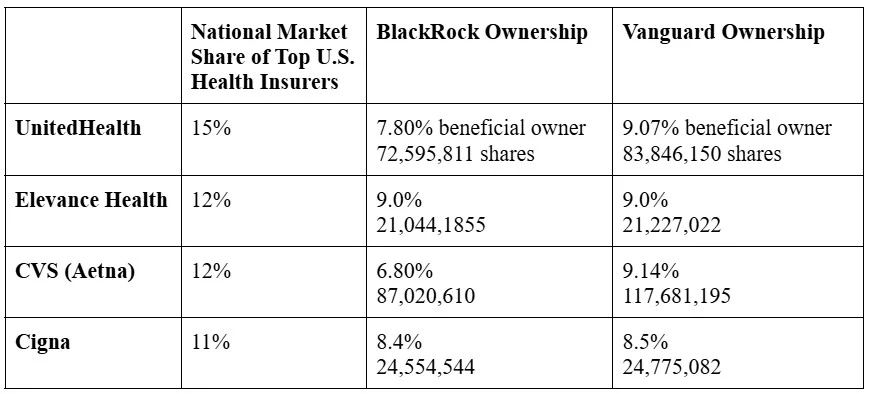
Data based on the most recent proxy statements of UnitedHealth, Elevance Health, CVS (Aetna) and Cigna published earlier this year. Exact numbers of shares and percentages may have fluctuated since then but the basic picture remains the same. (Derek Seidman)
Other Wall Street firms, like Fidelity, State Street, JPMorgan, and others are also huge shareholders of UnitedHealth and the other health insurance giants — just typically more in the 2-4 percent range.
The top 10 shareholders of UnitedHealth together have a 41 percent ownership stake in the corporation. Some of these firms are led by hugely influential billionaires, including BlackRock’s Larry Fink, Fidelity’s Abigail Johnson and JPMorgan’s Jamie Dimon.
While these top shareholders in health insurance corporations are so-called passive investors who invest widely across the entire corporate spectrum, they hold the power to compel changes around exploitative companies and industry practices if they choose.
Lobbyists & Campaign Donations
UnitedHealth can only pursue its insatiable quest for profits with the assistance of well-compensated lobbyists.
In 2023 and 2024 alone, UnitedHealth has spent $23,885,000 on federal lobbying carried out by an in-house lobbying team and nine outside lobbying firms. These lobbyists include influential former government officials and staffers with bipartisan ties.
On the Democratic side, UnitedHealth lobbyists include the former chief of staff for House Democratic Leader Hakeem Jeffries; the former director of legislative Affairs for then-Vice President Joe Biden; the former executive director of Nancy Pelosi’s campaign committee; the former chief of staff to former congressman and top Biden administration adviser Cedric Richmond; and a top fundraiser for House Democrats who is the former chief of staff to former House Democratic Leader Dick Gebhardt.
On the Republican side, UnitedHealth lobbyists include the former chief of staff for Sen. Mitch McConnell; the former chief of staff for Sen. Ted Cruz; and several officials from George W. Bush’s administration.
Additionally, in the 2024 election cycle, UnitedHealth’s PAC donated hundreds of thousands of dollars to federal and state politicians across the political aisle, including $15,000 each to both Democratic and Republican House and Senate campaign committees.
They also gave thousands to key congressmembers who sit in influential positions on committees that oversee and regulate the health care industry.
Industry Groups
However, much of the heavy lifting of defending the interests of health insurance corporations isn’t done by individual companies, but by their industry groups.
These industry groups unite the resources of entire corporate sectors to advance their agenda with a single voice. Big Oil has the American Petroleum Institute. Big landlords have the National Multifamily Housing Council. For health insurers, the key industry group is America’s Health Insurance Plans (AHIP).
AHIP’s board is composed of the CEOs from top U.S. health insurance companies. The president and CEO of AHIP is a former top executive from UnitedHealth, and the head of AHIP’s federal lobbying operation also previously worked for UnitedHealth.
“Industry groups unite the resources of entire corporate sectors to advance their agenda with a single voice.”
AHIP has spent over $26 million lobbying the federal government in 2023 and 2024, using in-house lobbyists and — like UnitedHealth — hiring nine outside lobbying firms similarly filled with former government staffers and officials. AHIP is also a major donor to political parties and elected officials, including the Democrats and their top leaders.
As the vehicle for defending the generalized corporate interests of health insurers, AHIP tries to destroy anything that threatens the for-profit health care system, especially single-payer health care.
In June 2018, AHIP joined other health care industry groups like Pharmaceutical Research and Manufacturers of America and the Federation of American Hospitals to create the Partnership for America’s Health Care Future, an astroturf operation aimed at crushing Medicare for All.
Taking on the System
Some health insurance executives are lamenting that they’re being cast as villains for simply “playing their role in the system,” according to The New York Times.
What’s omitted here is that health insurance corporations are not passive functionaries within the U.S. for-profit health care system, but active defenders of that system that mobilize campaign donations, lobbyists and industry groups to stamp out alternatives like a single-payer system that would cut out rapacious middleman profiteering from health care.
But the current groundswell of anger around the U.S. health care system should embolden new efforts to push for a single-payer, Medicare for All system — a demand for systemic change that could be a unifying anchor for a broad challenge to Trumpism and corporate rule exercised through both political parties.
UnitedHealth and other health insurance companies are part of a larger apparatus of corporate rule that must be combated through collective action focused on building the power needed to achieve systemic change.
To take on this megastructure, we will have to build our own counter structures, like grassroots and labor single-payer campaigns, debtor organizations, trade unions and tenant groups, and engage in confrontational political efforts and general strikes.
It’s clear we are living in a period of rising anti-systemic feelings and widespread anger at corporate profiteering over every aspect of our lives, from health care to housing to work. The time is ripe for building the collective organizations and capacities we need to challenge the structures that reward and enable corporate CEOs’ abuses.
https://consortiumnews.com/2024/12/16/u ... rate-rule/
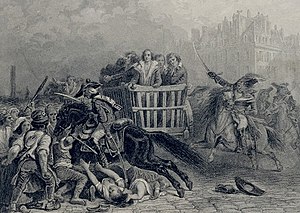
I'll drive))
"There is great chaos under heaven; the situation is excellent."
Re: "The history of all hitherto existing society is the history of class struggles."
Tom Neuburger: Why CEOs and the Very Rich Should Receive Enhanced Protection
Posted on December 17, 2024 by Yves Smith
Yves here. Tom Neuburger gives a wonderfully subversive argument as to why our CEOs and other overlords deserve only the very best in security.
In keeping with Tom’s theme, the first time I saw snipers on rooftops (and yes, one more than one building) was in the nice suburb of Mexico City where McKinsey had its offices, I assume in the embassy district, in 1984. I thought it could not be very pleasant to be rich if you had to live that way.
And a small addition to his piece: some people make themselves indispensable by being willing to aggressively support the indefensible. Here the example is Kathy Wylde, president for the Partnership for New York City, who we’ve lambasted more than a few times, including as the focus of posts like “Almost Cartoonish Defender of the 1%, Kathryn Wylde” Rears Her Head to Attack Plans to Tax the Rich to Save New York City.
By Thomas Neuburger. Originally published at God’s Spies
The case of Luigi Mangione puts people in a bind.
It doesn’t put media in a bind; the media’s covering CEO ass as fast as it can. About Brian Thompson, Ken Klippenstein writes, “The coverage seems more like a knighthood than journalism.”)
Our government is covering CEO butt with both hands as well. In a tweet with near 2 million views, Luke Goldstein notes this about the state of New York’s response:

From the linked Politico article:
State officials want to calm the nerves of New York City’s business elite after the assassination of UnitedHealthcare CEO Brian Thompson sent shockwaves through the corporate world.
Gov. Kathy Hochul will broker a virtual meeting Tuesday with state law enforcement officials and about 175 corporate representatives to discuss sharing security resources.
I wonder how many denied claimants Ms. Hochul has calmed. There are so many, I’m sure she’s talked to a few.
About “shar[ed] security resources,” here’s what that means:
[Kathy] Wylde [Partnership for New York City president and the business world’s contact person for this effort] told Playbook that the discussion will include the State Police as well as state Homeland Security and counterterrorism officials to show how intelligence can be shared with corporate security.
Homeland Security. For a lone gunman murder with no terror affiliations. It seems we have a home-grown federal police and its full force will be at their disposal. Nice for the CEO class to be so cared about.
It Really Is Class War
But this piece isn’t about the hypocrisy of the state:
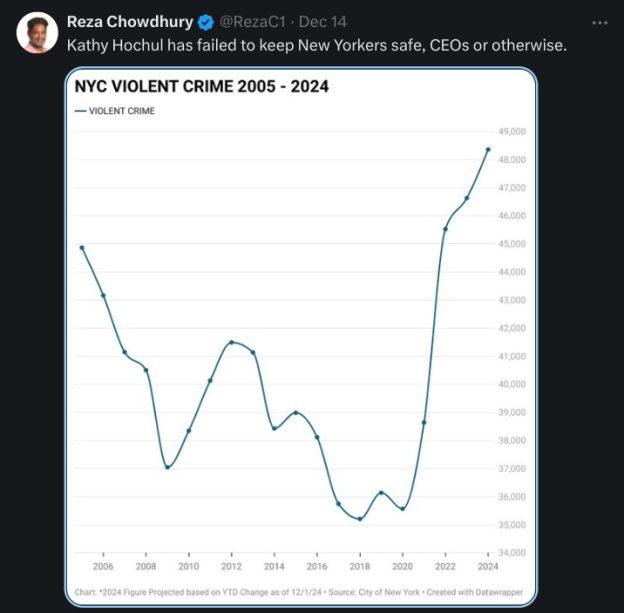
It’s about how right the state is to take this man’s death seriously.
Protecting the Opulent Minority
Bare fact: The U.S. was founded on class war. By “founded on,” I mean from the start. James Madison:
In England, at this day, if elections were open to all classes of people, the property of the landed proprietors would be insecure. An agrarian law would soon take place. [The Senate] ought to be so constituted as to protect the minority of the opulent against the majority.
“Opulent” is a lovely word. This is opulent:

The country since has suffered under the war of the classes (or the “orders,” as Madison called them). Jeffersonian democracy was opposed to the elitism of the Federalists. Over the next decades, the franchise was gradually extended, peacefully or not, until after the great Civil War (whose gains for Southern Black swere soon reversed), the very rich became the great dominant class.
But for a brief hiatus caused by the national pain of the Great Depression and its happier aftermath, the rich have held sway ever since.
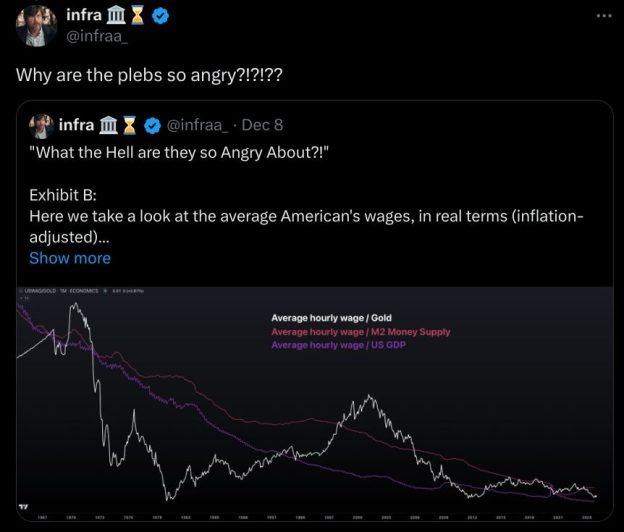
What’s worse, their power is unlikely to be taken away. Money controls our politics and our laws, more so every day. And the benefits of that control are, well, opulent.
So yes, of course, the CEOs should accept the cover and protection of a state that enables them and which they control. I strongly advise more of it. They should, in fact, have armed guards everywhere.

I’m serious. I think it’s important.
Why I’m in Favor of Billionaire Protection
There are two reasons to advocate seeing billionaires and their CEO operatives ostentatiously and aggressively protected.
First, each American can decide for her or himself whether murder is wrong or not. That decision comes with a catch, however:
If you support social murder — death at a distance executed by corporate greed — you also have to be fine with retaliation. Justifying one type of murder justifies both.
If you think all murder is wrong, you should then be strongly opposed to state-sanctioned death, including by corporate bodies who turn death into profit.
You can’t support corporate killing and oppose its deadly response. I myself oppose murder of all kinds. So I want our billionaires and their deadly corporate consiglieri very well guarded. Visibly, grandly, over-ambitiously guarded.

Why? For the second reason.
I want people to see with their eyes who their rulers are, to know without anyone having to launch into speech or explanation. To know by looking and feeling. To know in their bones.
Because class consciousness, folks. Or truth in advertising.
https://www.nakedcapitalism.com/2024/12 ... ction.html
First time I saw snipers on the roof was when Nixon was running for re-election at Steelworkers Hall in Baltimore, 1972. We moved very slowly...
Posted on December 17, 2024 by Yves Smith
Yves here. Tom Neuburger gives a wonderfully subversive argument as to why our CEOs and other overlords deserve only the very best in security.
In keeping with Tom’s theme, the first time I saw snipers on rooftops (and yes, one more than one building) was in the nice suburb of Mexico City where McKinsey had its offices, I assume in the embassy district, in 1984. I thought it could not be very pleasant to be rich if you had to live that way.
And a small addition to his piece: some people make themselves indispensable by being willing to aggressively support the indefensible. Here the example is Kathy Wylde, president for the Partnership for New York City, who we’ve lambasted more than a few times, including as the focus of posts like “Almost Cartoonish Defender of the 1%, Kathryn Wylde” Rears Her Head to Attack Plans to Tax the Rich to Save New York City.
By Thomas Neuburger. Originally published at God’s Spies
The case of Luigi Mangione puts people in a bind.
It doesn’t put media in a bind; the media’s covering CEO ass as fast as it can. About Brian Thompson, Ken Klippenstein writes, “The coverage seems more like a knighthood than journalism.”)
Our government is covering CEO butt with both hands as well. In a tweet with near 2 million views, Luke Goldstein notes this about the state of New York’s response:

From the linked Politico article:
State officials want to calm the nerves of New York City’s business elite after the assassination of UnitedHealthcare CEO Brian Thompson sent shockwaves through the corporate world.
Gov. Kathy Hochul will broker a virtual meeting Tuesday with state law enforcement officials and about 175 corporate representatives to discuss sharing security resources.
I wonder how many denied claimants Ms. Hochul has calmed. There are so many, I’m sure she’s talked to a few.
About “shar[ed] security resources,” here’s what that means:
[Kathy] Wylde [Partnership for New York City president and the business world’s contact person for this effort] told Playbook that the discussion will include the State Police as well as state Homeland Security and counterterrorism officials to show how intelligence can be shared with corporate security.
Homeland Security. For a lone gunman murder with no terror affiliations. It seems we have a home-grown federal police and its full force will be at their disposal. Nice for the CEO class to be so cared about.
It Really Is Class War
But this piece isn’t about the hypocrisy of the state:

It’s about how right the state is to take this man’s death seriously.
Protecting the Opulent Minority
Bare fact: The U.S. was founded on class war. By “founded on,” I mean from the start. James Madison:
In England, at this day, if elections were open to all classes of people, the property of the landed proprietors would be insecure. An agrarian law would soon take place. [The Senate] ought to be so constituted as to protect the minority of the opulent against the majority.
“Opulent” is a lovely word. This is opulent:

The country since has suffered under the war of the classes (or the “orders,” as Madison called them). Jeffersonian democracy was opposed to the elitism of the Federalists. Over the next decades, the franchise was gradually extended, peacefully or not, until after the great Civil War (whose gains for Southern Black swere soon reversed), the very rich became the great dominant class.
But for a brief hiatus caused by the national pain of the Great Depression and its happier aftermath, the rich have held sway ever since.

What’s worse, their power is unlikely to be taken away. Money controls our politics and our laws, more so every day. And the benefits of that control are, well, opulent.
So yes, of course, the CEOs should accept the cover and protection of a state that enables them and which they control. I strongly advise more of it. They should, in fact, have armed guards everywhere.

I’m serious. I think it’s important.
Why I’m in Favor of Billionaire Protection
There are two reasons to advocate seeing billionaires and their CEO operatives ostentatiously and aggressively protected.
First, each American can decide for her or himself whether murder is wrong or not. That decision comes with a catch, however:
If you support social murder — death at a distance executed by corporate greed — you also have to be fine with retaliation. Justifying one type of murder justifies both.
If you think all murder is wrong, you should then be strongly opposed to state-sanctioned death, including by corporate bodies who turn death into profit.
You can’t support corporate killing and oppose its deadly response. I myself oppose murder of all kinds. So I want our billionaires and their deadly corporate consiglieri very well guarded. Visibly, grandly, over-ambitiously guarded.

Why? For the second reason.
I want people to see with their eyes who their rulers are, to know without anyone having to launch into speech or explanation. To know by looking and feeling. To know in their bones.
Because class consciousness, folks. Or truth in advertising.
https://www.nakedcapitalism.com/2024/12 ... ction.html
First time I saw snipers on the roof was when Nixon was running for re-election at Steelworkers Hall in Baltimore, 1972. We moved very slowly...
"There is great chaos under heaven; the situation is excellent."